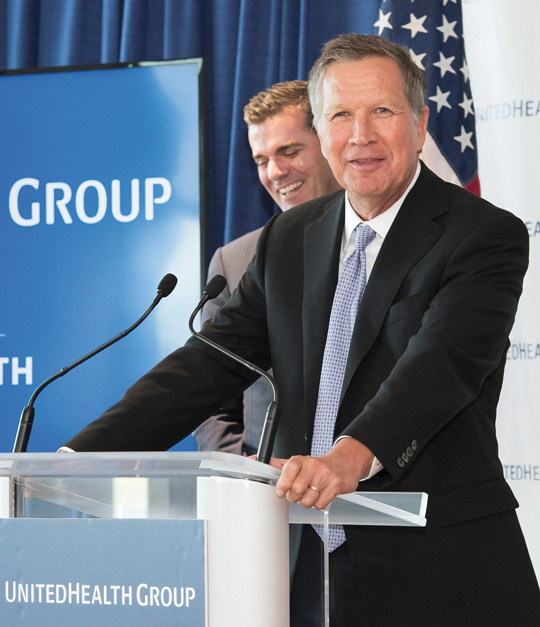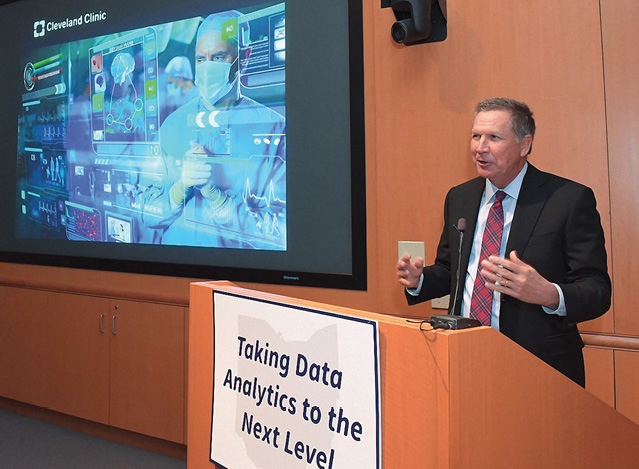- Home
- Media Kit
- Current Issue
- Past Issues
- Ad Specs-Submission
- Ad Print Settings
- Reprints (PDF)
- Photo Specifications (PDF)
- Contact Us

![]()
ONLINE

Moving Ohio Forward
Editors’ Note
John Kasich was sworn in as Ohio’s 69th governor on January 10, 2011 and was reelected to a second four-year term beginning in 2016. He served as a member of Congress from central Ohio for 18 years and, as the Chairman of the House Budget Committee, he led the effort to balance the federal budget for the first time since 1969 and helped enact historic welfare reform. After leaving Congress in 2000, Kasich worked as a managing director in the Investment Banking Division of Lehman Brothers, where he helped companies secure the resources they needed to succeed and create jobs. He was also a commentator for FOX News, a Presidential Fellow at his alma mater, The Ohio State University, and a candidate for the Republican nomination in the 2000 and 2016 Presidential campaigns. Kasich is the author of four New York Times best-sellers: Courage is Contagious; Stand for Something: The Battle for America’s Soul; and Every Other Monday, which was published in 2010 and focuses on the importance of faith in making both everyday choices and life-changing decisions. His most recent book is Two Paths: America Divided or United.
One of your priorities for Ohio has been preparing the state for a rapidly changing workforce and establishing better connections between educators and businesses. Will you discuss these efforts?
I don’t think any state is doing this well. In Ohio, we have been focusing on workforce for a while but, in order to achieve what we want to, we need education, business, and government and its resources to work together to create a comprehensive program. This involves changing the education system and directing it toward a more modern, flexible system rather than the one that was invented 100 years ago.
We need businesses to step up and start thinking about online curricula to give people a chance to learn and acquire new skills at any time. Government must have the right incentives in place to make sure that the resources are there to incentivize people and companies to engage in training.
We’re trying to tackle all of this, but it’s daunting. When people say they have fixed their workforce problems, they’re usually not telling the whole truth. It is challenging, particularly with a changing digital economy.

Governor Kasich joined UnitedHealth Group
to announce 700 new jobs in Ohio
We continue to work hard on it. I’m meeting with insurance companies to work with them to develop an online curriculum that would allow people to gain a competency-based education. They can study the material, pass tests, and even schedule an interview online, then perhaps get a job and move into a great industry.
Our goal is to create an education system that doesn’t let the system get in the way of the learning, but this can be very difficult because our education systems are, too often, resistant to change.You
We have to get this done because we have such a rapidly changing economy. We must make sure our people have skills appropriate for today’s jobs because, if they don’t have them, then we’re going to see more disruption. By that, I mean seeing more people unemployed and more angst, and that is not acceptable.
I work with everybody I can to make sure we are really moving ahead. Ohio is holding its own, and we’re probably better than most because we recognize this, but this is a big challenge for our nation.
You’re also working to keep Ohio ahead of the curve in terms of technology and innovation. This seems like more of a private sector role, but can government be helpful by putting the right policies in place?
Yes, because this effort is a partnership. If I invest in our infrastructure, it allows the private sector to come in and do the R&D and testing that they need. If I spend money on a transportation research center, it provides a resource for the automotive industry to come here and do what they need to do to develop the new vehicles we’re going to see on our roads.
Cleveland Clinic’s data analytics allow them to be more effective in treating people who have illness. I know that I can use similar data analytics to analyze why kids have difficulty reading at the third-grade level or why moms aren’t birthing healthier babies. I can then use that information to be able to deliver better services. This is an example of how we learn from the private sector.
Another example is drones. We know that drone technology is advancing. We should work to be in a position to benefit from that technology. We should also help companies be more successful by providing a platform for them that will facilitate their ability to develop their products more effectively.
We also privatized economic development in the state. Now, with JobsOhio, the most unique economic development entity in the country, we believe that more dynamic economic development can occur through a not-for-profit rather than through a government bureaucracy. JobsOhio is filled with people who have all the tools to be highly effective and who can operate at the speed of business rather than the speed of government.

Governor Kasich meeting with Honda President and CEO
Takahiro Hachigo in Tokyo. Honda is one of Ohio’s
largest employers and one of the most innovative companies
around the world
Business leaders across Ohio talk about the strength of the state from a business standpoint based on your business friendly platform. Is that message well understood?
We’re doing a lot better for many reasons. When Cleveland was able to capture the Republican convention, it displayed the strength of that city, which surprised a lot of people throughout the country.
We have also gotten more recognition through sports that help display the freshness and broad appeal of our state.
People generally look at our tax structure, our fiscal stability, our workforce, and the way in which we undertake economic development. Those things, over time, have allowed us to project an Ohio that is more modern and innovative and on the move.
We are also located within 600 miles of 60 percent of the population of the country. This is an attractive incentive as other countries look at how they position their companies to have access to these markets. This has helped lead to significant foreign direct investment. The country doing the most is Japan.
Our brand is improving. The way in which we measure our statistics and the resulting analytics defining what Ohio is all about are all working to improve our brand.
We do have an issue with our population. Even though we’re developing great city centers and have people moving back into the cities and urban areas, we still need to grow our population. Bringing more new businesses here will help with this.
There is a frustration in nearly every state about what needs to be done to fix K-12 education. In Ohio, how critical is reform in this area, and how frustrating has it been to affect change?
Our education system resists change and there are a variety of factors causing this. This is why we want to improve diversity, and support charters and vouchers and really encourage those schools. We are beginning to see change in a number of them now. It isn’t enough, but there is some.
Some of these schools have become more entrepreneurial. They realize that we have to put our children into an environment where they can learn how they need to conduct themselves and the opportunities that exist in the business world. This makes education more relevant.
I’m impatient, so I would like to see everything fixed in a day, but I also know that as a leader, I’m part of a relay team. I can only do so much of this myself and then hand it off to the next person.
There is a significant possibility that we will see K-12, in some ways, disintermediated by technology. This could allow students to learn online with coaches, as opposed to teachers, who will be better able to manage more individualized forms of education. We will be tapping into the passions and gifts of students, because everybody is not built the same.
If we’re teaching everyone the same way, we’re not connecting the way we need to, based on each student’s individual skills. This is the future of K-12.
Higher education still costs too much and those institutions don’t want to change. They will be disintermediated with online education at a fraction of the cost, so the traditional institutions will have to change as well.
Everything has to change today. We’re in a digital revolution.

Governor Kasich discusses Ohio’s plan to take data analytics
to the next level at the Cleveland Clinic
You’re a national voice around key issues. When you talk to young people who are concerned about their future, do you find they also are worried when they feel that nothing is getting done in Washington?
The young people aren’t anxious; they’re excited about the future. However, traditional politics have become less relevant to them. If all the politicians are going to do is fight, people lose interest in it.
If politics is always partisan, it becomes irrelevant and boring, and people tune it out. We’re seeing politics in America change, and it has to become more about exciting new ideas rather than about whether one is wearing a red or blue uniform.
You’ve always been a solutions-oriented and optimistic person by nature. Is it hard to maintain that?
No, we’re just in a bad cycle. Over time, better leaders will emerge. There is always a big question about whether leaders make the times or the times make the leaders. It’s a bit of both.
People are increasingly becoming fed up with the political environment, but I don’t think there is a leadership slump only in politics; it’s across the board, be it in business, sports, or religion. We have seen a dearth of really good leaders, and we’ve paid a price for that.
We also need good followers. It’s the followers who say to the leader, “You’re off base, so get back on course.” The followers must have integrity and demand good results from leaders.
Do you ever take the time to appreciate what you’ve been able to accomplish in Ohio?
Sure. The most important area for us was economic growth and development because many good things come from that, and we’ve seen a dramatic uptick in Ohio. We’ve seen it improve the reputation of the state, and I’m very happy with our progress. I feel good about what we’ve done, but I also recognize that there are going to be people that will follow after me soon, and I’m handing them the baton of the state that is stronger in so many ways. I’ve had a great time.•